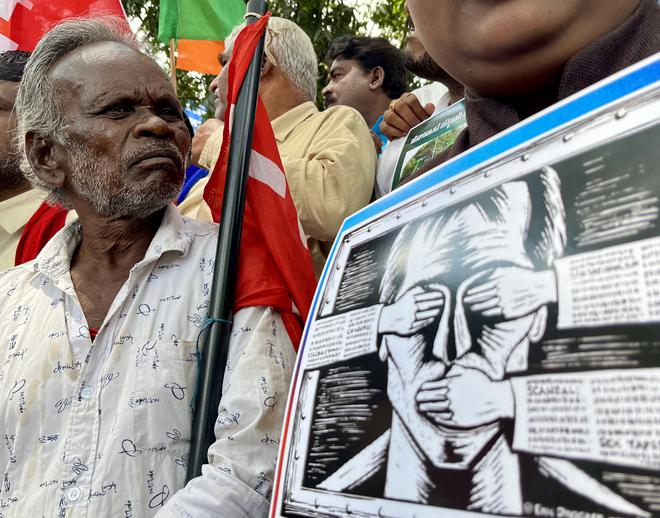The Bengaluru police on October 2 - Gandhi Jayanti - detained several protestors affiliated to the Horatada Hakkigaagi Janandolana who were holding a demonstration opposing the Licensing and Regulation of Protests, Demonstrations, and Protest Marches (Bengaluru City) Order, 2021, which deems protests outside Freedom Park in the city illegal.
The Bengaluru Police Commissioner issued the order, brought into effect in January 2022, during the previous BJP government led by Basavaraj Bommai, which restricted all protests to Freedom Park. One of the reasons cited was traffic snarls protest marches resulted in.
However, civil society groups say the decision has made protests invisible. Members of Horatada Hakkigaagi Janandolana, which is a coalition of progressive and democratic groups and individuals, demanded that the right to protest be protected and the unreasonable restrictions imposed be withdrawn.
Over the year
“For over a year and a half, the police have restricted protests and public gatherings in any place other than Freedom Park, and have refused permissions for processions. This has caused enormous hardship to all those seeking to protest the violation of their fundamental rights,” said Vinay Sreenivasa from the Janandolana.

Maitreyi Krishnan, another group member, said, “We reject this order as it is unconstitutional. In May, workers participating in a May Day rally were met with police action, and last November, the pride march was prohibited.”
The police, however, have maintained that the order followed a direction from the Karnataka High Court.
However, Mr. Sreenivasa pointed out that in 2022, the Karnataka High Court was hearing a suo-moto PIL which sought restrictions on protests. Even before the judgment was passed, the Police Commissioner of Bengaluru issued an “undemocratic” order governing protests, he alleged. “After the issuance of the 2021 order, the High Court closed the petition,” he added.
Central jail to protest venue
Freedom Park, previously a Central Jail, was transformed into a memorial park in the early 2000s after the jail’s relocation to Parappana Agrahara. In the late 2000s, it became one of the designated protest sites in the Central Business District, replacing Cubbon Park where protests were previously permitted.
Considering the city’s vast expanse of over 700 sq.km. and its status as the State’s capital, accommodating voices from various parts of the State, the sole protest venue remains a limited section of Freedom Park. This area, which includes a memorial for the former Central Prison and a multi-level car park, can accommodate no more than 3,000 people at best, according to protesters.







